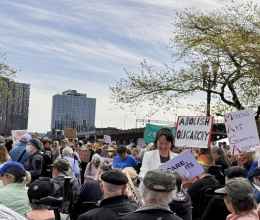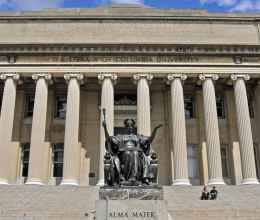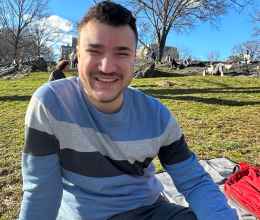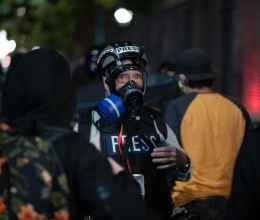
Since January, the Trump administration has abducted several international students and faculty and detained them thousands of miles away from their loved ones all because these scholars have spoken about Israel and Palestine in ways the government doesn’t like. But criticizing U.S. foreign policy, or voicing any other opinion, is protected by the First Amendment—no matter your immigration status.
The ACLU and its partners are representing Rümeysa Öztürk, a Fulbright scholar and Ph.D. student at Tufts University who was arrested and detained by Immigrations and Customs Enforcement (ICE) agents in Somerville, MA.
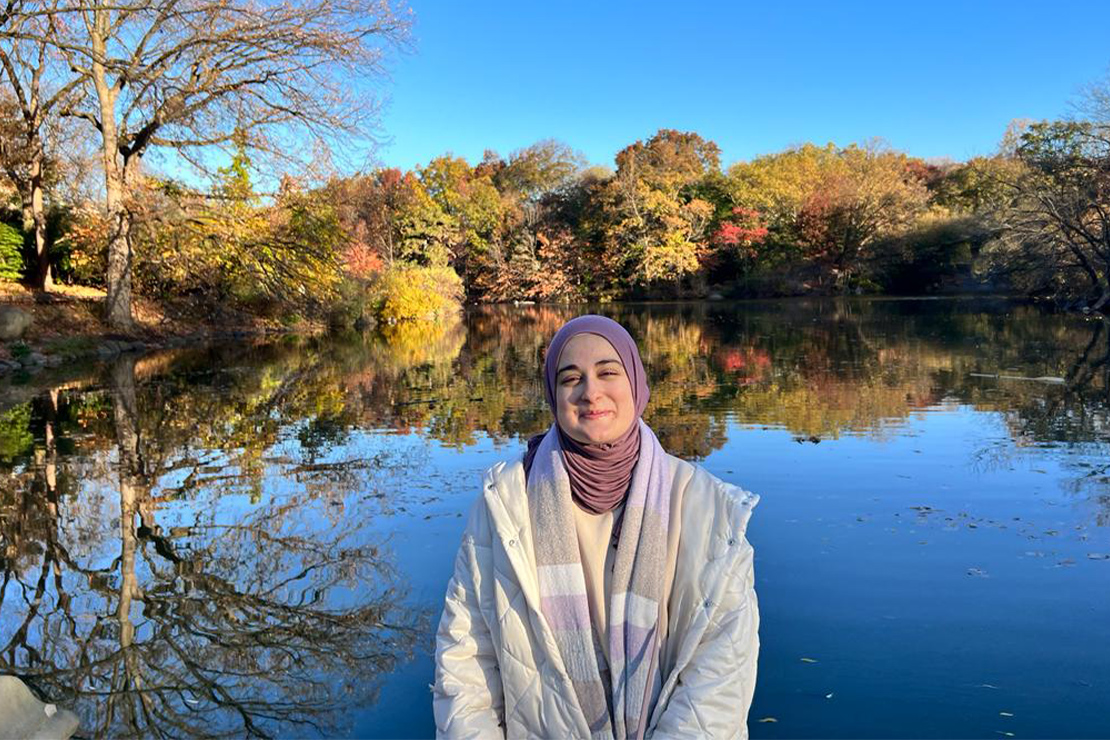
Rümeysa Öztürk's legal team
On Monday, April 14, Ms. Öztürk’s legal team asked the Vermont federal judge to affirm that the case should stay in Vermont, and to order her immediate release from ICE detention before she is further harmed by the government’s unconstitutional actions.
So, What Happened?
On March 25, Ms. Öztürk was planning to go to an iftar dinner with friends. Instead, while walking near her apartment, she was approached and then grabbed by a hooded man. Other figures soon closed in, including several wearing face coverings and dark clothing. Finally, one officer flashed a badge; however, in recent court filings Ms. Öztürk has attested that she did not know they were immigration officers and genuinely feared for her life. Footage shows the plainclothes ICE agents arrested and detained her, then placed her in an unmarked vehicle.
That evening, she was brought to Methuen, MA; then, to Lebanon, NH; and, finally, to St. Albans, VT where she spent the night in a detention cell. While ICE was driving Ms. Öztürk all over New England, her lawyer was frantically filing an emergency habeas petition. That night, a Massachusetts court ordered the government not to remove her from Massachusetts without prior notice.
However, early the next morning, without notifying the court, her counsel, or the Department of Justice counsel, federal agents took her to Patrick Leahy Burlington International Airport and transported her to Louisiana, where she has remained in detention ever since. While in transit, Ms. Öztürk suffered an asthma attack, which her friends had been worried about as she did not have her medication. Since being detained, she has suffered at least three more medical episodes.
Who is Rümeysa Öztürk?
A child development researcher who is getting her Ph.D. at Tufts University, Ms. Öztürk is known for her dedication to her work, to her community, and to her loved ones.
A former boss said in a letter to the court that as a teaching assistant she was “outstanding—kind, approachable, and deeply attentive to the psychological needs of her students as we navigated the challenges of the pandemic.” He said that "students in her section wrote glowing reviews, highlighting her empathy, dedication, and commitment to their well-being.”
A good friend describes her to ProPublica as a “bookish cat lover” who was “serious about [her] studies and [her] faith.” Her roommate calls her “a friend with a kind heart and uplifting spirit.”
In her own words, she describes herself as “a Ph.D. student working with children and youth,” saying, “we know that injustice in the world and systemic brutality towards people of color has long-lasting negative effects on children, youth, and other communities. My life is committed to choosing peaceful and inclusive ways to meet the needs of children. I believe the world is a more beautiful and peaceful place when we listen to each other and allow different perspectives to be in the room. Writing is one of the most peaceful ways of addressing systemic inequality. Efforts to target me because of my op-ed in the Tufts Daily calling for the equal dignity and humanity of all people will not deter me from my commitment to advocate for the rights of youth and children.”
Why Is the Government Detaining Öztürk?
To be clear, Ms. Öztürk has not been charged with any crime. According to all available evidence, the government is putting Ms. Öztürk through this harrowing experience solely because of the op-ed that she co-wrote with four other students for the college newspaper last spring. The op-ed criticized Tufts leadership’s response to the Tufts Community Union Senate passing several resolutions concerning human rights violations in Gaza. Months after that op-ed was written, and just weeks before she was detained, the website Canary Mission published a profile on Ms. Öztürk, including her photograph, claiming she “engaged in anti-Israel activism.” Its sole support for the contention was a link and screenshots of her op-ed. When asked about her case, Secretary of State Marco Rubio confirmed revoking her visa, adding, “we gave you a visa to come and study and get a degree, not to become a social activist that tears up our university campuses.”
On April 14, the Washington Post obtained an internal State Department memo that was prepared days before Ms. Öztürk was detained, which found no evidence linking her to antisemitism or terrorism.
Why Is ICE Sending People to Louisiana?
The government claims it brought Ms. Öztürk to St. Albans, VT, because there were no overnight beds for women available in Massachusetts. Usually, ICE detains people in Vermont in a state correctional facility; for women, that’s typically Chittenden Regional Correctional Facility (CCRF). ICE officials also said in court documents that out-of-state transfers are “routinely conducted after arrest, due to operational necessity.”
It is true that over half of all immigration detainees are held in Texas and Louisiana; March 2024 data suggests 18,596 people were detained in those two states compared to just 204 in Massachusetts or 648 in New York. However, immigration attorneys say the late-night hopscotch is an increasingly common ICE tactic to complicate jurisdiction and thwart legal attempts to stop them from being removed. Louisiana and Texas, they say, are also favored destinations because the courts often issue decisions limiting migrant rights.
More generally, moving people away from their community isolates them from their attorneys, family, and friends, which the government hopes will drive some to give up their legal fight to stay in the United States.
Has the Government Gone After Other Students?
Ms. Öztürk is one of several students and scholars that the Trump administration has targeted for their protected speech. Her detainment follows those of recent Columbia University graduate student Mahmoud Khalil, a permanent U.S. resident; and Georgetown University’s Dr. Badar Khan Suri.
Since Ms. Öztürk’s detention, the Trump administration has also begun revoking thousands of student visas across the country, often with no explanation whatsoever.
What Happens Next?
Ultimately, the Trump administration cannot order ICE to silence anyone with political opinions they disagree with, which is exactly what the ACLU of Massachusetts, ACLU of Vermont, CLEAR, and the rest of Ms. Öztürk’s legal team are arguing in court. We are urging the judge to order that ICE immediately release Ms. Öztürk so that she can be reunited with her community in Somerville, where she hopes to resume her studies as soon as possible.
A version of this article originally appeared on the ACLU of Vermont’s website.
